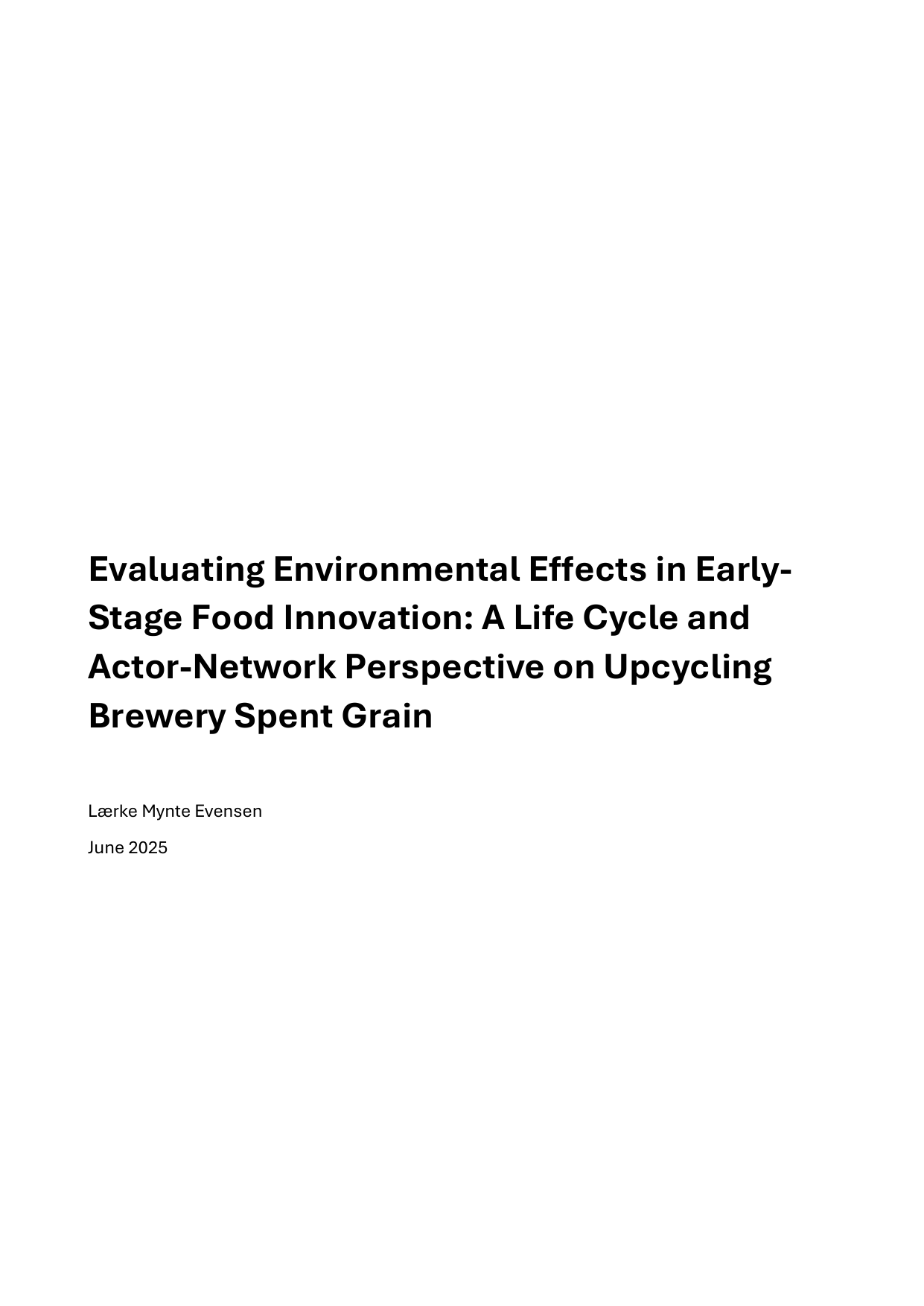
Evaluating Environmental Effects in Early-Stage Food Innovation: A Life Cycle and Actor-Network Perspective on Upcycling Brewery Spent Grain
Author
Term
4. Term
Education
Publication year
2025
Submitted on
2025-05-28
Pages
41
Abstract
Klimaudfordringen kræver, at vi gentænker vores omgang med ressourcer og affald, særligt i fødevaresektoren. Denne afhandling tager udgangspunkt i et konkret casestudie af en dansk startup, der sammen med et bryggeri og et bageri forsøger at opgradere mask – et restprodukt fra ølproduktionen – til nye fødevareprodukter. Projektet indgår i det nationale initiativ Closing Loops, hvor samarbejde på tværs af værdikæden skal bidrage til at mindske både madspild og CO₂-udledning. Gennem etnografiske metoder og feltstudier har jeg fulgt processen tæt og fået indblik i de praktiske og logistiske barrierer, der opstår, når våd mask skal håndteres under hensyntagen til fødevaresikkerhed, økonomi og mulighederne for opskalering. Med Actor-Network Theory (ANT) som analytisk ramme belyser specialet, hvordan materialer, aktører og teknologier gensidigt former innovationen og stiller krav til samarbejde og organisering. For at vurdere de miljømæssige konsekvenser har jeg gennemført en screening-baseret livscyklusvurdering (LCA), hvor både attributionelle og konsekvensbaserede tilgange er anvendt. Analysen viser, at omdirigering af mask fra dyrefoder til menneskeføde kan have både fordele og ulemper, alt efter hvordan værdikæden organiseres, og hvilke substitutionsvalg der træffes. På baggrund af caseanalysen introducerer specialet et sæt supplerende vurderingskriterier, som tager højde for de praktiske afhængigheder, systemiske effekter og mulige utilsigtede konsekvenser, der ofte overses i konventionelle evalueringsrammer. Endelig perspektiveres casen ved hjælp af Multi-Level Perspective (MLP), som sætter fokus på, hvordan politiske rammer og støtteordninger kan påvirke udviklingen af cirkulære løsninger – ofte med utilsigtede eller begrænsende følgevirkninger. Specialets hovedbidrag er et nuanceret indblik i, hvordan cirkulær økonomi kan fremmes i praksis, og en opfordring til at tænke helhedsorienteret, når bæredygtige løsninger skal vurderes og implementeres.
Climate change represents an urgent challenge that calls for more sustainable management of land and resources. This thesis investigates the potential of circular economy principles and the waste hierarchy as tools to address this issue, focusing on an empirical case study of a Danish startup working with the upcycling of brewers’ spent grain (BSG) – a by-product of beer production – into bakery products. The case is part of a value chain collaboration under the Closing Loops initiative, involving a bakery, a brewery, and the startup, with the goal of reducing waste and CO₂ emissions through circular partnerships. Data collection is grounded in ethnographic methods, enabling close observation of the practical and logistical challenges associated with handling wet BSG, including issues related to food safety, economics, and scalability. Actor-Network Theory (ANT) is used to map the complex network of human and non-human actors involved in the value chain, expanding the analysis from internal company processes to a more systemic understanding of innovation in practice. A critical screening-level Life Cycle Assessment (LCA), including both attributional (aLCA) and consequential (cLCA) perspectives, highlights the environmental consequences of diverting BSG from animal feed to human food. This approach assesses not only the direct effects, but also the methodological potential and limitations of LCA in early-stage innovations. To strengthen the evaluation of circular innovation in practice, the thesis develops supplementary criteria that reflect the complexities identified in the case study. Informed by both empirical findings and theoretical perspectives, these criteria expand the current evaluation beyond quantifiable outcomes to include practical dependencies, system-level effects, and the risk of unintended consequences within the value chain. Finally, a systemic analysis using the Multi-Level Perspective (MLP) situates the case in a broader context, examining how regulations and political frameworks shape the treatment of BSG. The analysis shows how EU regulations and support schemes can unintentionally promote fragmented solutions and regime shifts that oversimplify decision-making processes. The thesis argues for a holistic approach, integrating environmental and socio-technical perspectives to support sustainable innovation from the earliest stages. The main contribution of this thesis is a nuanced, system-oriented understanding of circular economy practices, emphasizing the importance of considering material flows, network dynamics, and potential rebound effects in decision-making and policy for sustainable innovation.
Documents
